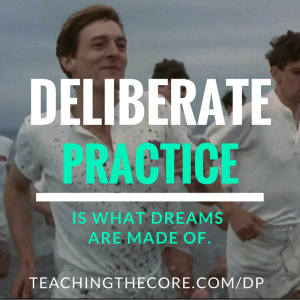
One of the best reasons for infusing character strengths into our instruction is totally selfish: even if we completely fail to help our students grow character, our lives become richer as we grow the strengths in ourselves.
And yet, this personal character growth is not truly selfish, either — not if our aim is to help our students leverage these strengths toward their long-term growth. Heck, it's not even optional because one of the best ways to help our students develop character in themselves is if we show them with our lives that this work is worth doing.
So the purpose of this post is simple: I want to encourage you to think of times in your own life when character has helped you, and I want you to work on sharing one of those times with your students in the week to come. This doesn't mean coming up with a whole lesson plan — character strengths instruction should not derail curricula. Instead, just look for the opportunity in the week to share with your students an example of character strength work in your own life.
To help, I'll share an example from my own life below. It focuses on one particular element of one particular strength (deliberate practice, a key part of grit). This kind of drilling down to specific chunks is important for teaching any skill.
Deliberate practice as illustrated by my work at TeachingtheCore.com
In a few weeks, this blog will celebrate its third birthday. Three years ago today, I knew I wanted to start a blog, and I knew I wanted it to focus on a specific problem faced by myself and other teachers, but I still didn't know what I would write about.
I just knew that, if I put in the work and learned aggressively, the blog could help me with numerous goals that I had for myself at the time:
- Become a clearer thinker and communicator
- Write a book
- Promote the long-term flourishing of more students than just my own by helping out fellow teachers
- Earn a supplemental income for my growing, single-income family
I had specific versions of these goals, ranging in aggressiveness from “Can't Miss” kind of goals (have one teacher comment) to “Land on Mars” goals (write for 10,000 subscribers).
I just needed a problem to solve.
A few weeks later, on May 6, I had chosen my first dragon: the Common Core freakout. I had no business doing this — I had never fully read a standards document in my career at that point — but for various reasons I felt compelled to do it… and I did!
What the deliberate practice looked like
Externally, running a blog seems simple to many people I talk to. But over the past three years, I've put at least a thousand hours into figuring out blogging. That might sound like a lot, but it averages out to a little less than an hour a day.
It's hard to describe the kinds of things I did in those 1,000 hours without it sounding either insanely complex or insanely boring: WordPress, plugins, themes, CSS, HTML, Mailchimp, bookkeeping, contract negotiation, advertising schedules, iMovie, shortcodes, opt-in forms, conversion rates.
Here's a specific example from my last post: I was trying to embed a video from Vimeo and get it to be center aligned. Unfortunately, every time I saved the post, the video would revert to left alignment. But I had dealt with this problem before, so I knew to go into the “Text” tab of the WordPress editor, find the IFRAME embed code, add p style=”text-align: center;” on either side of the embed code, and then go back into the “Visual” tab of the WordPress editor and save the post. The video was then center aligned and stayed that way.
So that's what deliberate practice is like in blogging: it seems complex on the outside, but mostly it's just very boring and repetitive. With every week, I pick up a few more tricks, a few more tweaks, a few more troubleshooting workarounds to problems I've not yet been able to solve. I do this by speaking with other bloggers, calling support lines, and just puzzling through the issues.
And if you're saying, “Wow — that sounds lame,” let me be clear about the point I'm trying to make: never in my life did I gaze into the future and dream of working with embed codes and WordPress tricks and p styles.
NEVER.
But I did get into this gig of teaching to make the lives of others just a tiny bit better, and I did dream of developing my God-given potential as much as I could while enjoying things along the way.
And those things, my friends, are only possible through the use of deliberate practice. It matters not what your dream is: deliberate practice — boring, un-sexy, lame deliberate practice — is what dreams are made of.
The long-term passion that drove the deliberate practice
But this is not just a grainy, black and white film of blood and sweat and tears where the protagonist grudgingly does his work despite having no reason to do so.
No: in this film, Chariots of Fire blares in the background because the kind of deliberate practice that Angela Duckworth describes when she talks about grit is fueled by zest, by passion. There's fire in this film, and it burns within the protagonist's chest like a sun.
I was (and am) driven by those goals above. I was driven by a desire to not just think about sharing interesting work and meeting interesting people, but to actually do those things. So I did (and do) the work, bit by bit, in the little snatches of time that I make, and the cumulative results of all those little bits of boring work over the past three years have been life-changing.
Coming up with examples from your own life
Every teacher on the planet has examples of the power of deliberate practice in their life. How did you earn your teaching degree? How have you built your richest personal relationships? What is it that has made you an expert at ________? Why are you a Level 500 Mage Warlock Goblin in World of Warcraft? (No, don't use that one.)
Three walkaway items:
- Pick an example of how deliberate practice has made your life better. Be sure that the practice was quite often boring or frustrating, and that the practice didn't show immediate results.
- Practice communicating that story to students (feel free to practice in the comments below).
- Share it with at least one student in the week to come for the purpose of trying to communicate to that student the nature and reward of gritty practice.

Donette Dalcin says
Thank you for this post! During my brief career of teaching, 7 years and counting, I have used examples from my own life to illustrate that determination and hard work can pay off. I tell my students that I struggled my whole school career with math and was required to go to summer school twice and spend countless hours after school getting extra help from my Algebra teacher. I also let them know that this lack of math confidence came to a head when, after being out of college for 12 years, I decided to go back to finish my bachelors degree. I was informed that one of the classes I would have to take was Chemistry. I almost cried. The only science I had taken in high school was Freshman Physical Science and Senior year Physiology. Now if I really wanted to earn my Bachelors degree I had to tackle Chemistry. It was not pretty – hours during evenings and weekends teaching myself the basic equations to solve conversion problems, balancing equations, etc. I failed one of the courses and had to take it again. (This lets me tell students what happens when you fail in college – there are no refunds, you have to take it again and pay for it) I ended up taking my final Chemistry course the last semester before graduating – along with College Math – and passed with a B-. Today, I help students with Chemistry and math (crazy!). But I also try to illustrate the concept of determination and perseverance. I ask them “How badly do you want this?” and sometimes tell them they don’t want it badly enough yet. Don’t get me wrong. I love my students. I want them to succeed in whatever they choose to do, but they can’t get there without determination, grit and hard work.
davestuartjr says
Donette, what an awesome story to share with your students. I find that, even in my English and world history kids, one of the most common fixed mindsets I hear kids share are those around their abilities in math or science. Maybe they are going into math/sci classes and saying how they’re just no good at reading or writing, too — I don’t know 🙂
What I do know is that you have a powerful story for students. It dramatically illustrates the power of deliberate practice.
Michelle says
Sports offers such clear examples for me. I am 5’3″ and earned an all conference award because of deliberate practice. I served 100 times straight (starting over at 95 was the worst!) 5 nights a week through the summer. Boring – yes! But during our state tournament, in one game I scored 15 points in a row. That was cool and only happened because of deliberate practice!
davestuartjr says
Michelle, it truly does! Daniel Coyle, in his books about developing talent, uses many illustrations from sports. 100 times in a row… I love that!
Sharon Thurman says
Dave,
Your blog has been successful because it is filled with your stories. Each blog post is a window into your reflections of what worked and what did not. I appreciate your posts and share many of them with the teachers I work with as our district’s literacy staff developer. I too used personal stories in my teaching. As your children get older, you will find yourself using their stories as well. It not only gives us examples for our students, but helps them see that we are life-long learners too.
Thank you for your blog. I look forward to reading each post and learning with you.
davestuartjr says
Sharon, thank you so much! It is heartening to know that these posts are doing something in the world 🙂
Jessi Bradley says
Thanks for keeping it “real”, Dave!
Deliberate practice: PARENTING! Read before the baby’s born, after the baby’s born, every day…day after day…in the trenches. Reward: awesome adults, contributing to the world.
Kristina says
If people are interested in this post, they may also be interested in a recent Freakonomics Radio podcast (http://freakonomics.com/podcast/peak/) about the researcher who delves into deliberate practice, Anders Ericsson. They also interview Angela Duckworth one episode later (http://freakonomics.com/podcast/grit/)